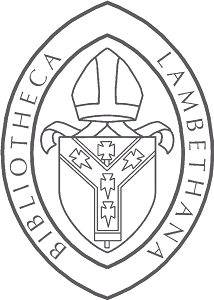The Friends of Lambeth Palace Library not only help to purchase material for the Library but they also facilitate other parties who wish to donate books or manuscripts to the Library. A significant accession that has come to us in this way is a copy of Missale secundu[m] vsum insignis ecclesiae Sa[rum] printed in Rouen in 1510 for the English market, and which is only otherwise known from a surviving fragment. It was presented to the Library through the Friends of Lambeth Palace Library by the Green family of Oklahoma City in 2014.

It is a very attractive volume and retains a contemporary blind-tooled Cambridge calf binding over wooden boards (although it has been re-backed). Printed in red and black, it has typeset music on a four-line stave, as well as several fine woodcuts. As with many missals that were printed on paper at this time, the four leaves of the Canon of the Mass are printed on vellum. As this was the most used part of the book, vellum was used for durability. The Canon also contains two full-page illustrations (The Crucifixion and God the Father) with contemporary hand-colouring (see below).

The book was purchased by the Greens in 2013 from the sale of the Mendham Collection by the Law Society and they subsequently offered it to the Lambeth Palace Library. Mr Richard Linenthal of the Friends looked after the practicalities and legalities of the transfer. In 2014 Mr Steve Green (see below) presented the book to Lord Salisbury, Chairman of the Friends of Lambeth Palace Library, who formally accepted it on the Library’s behalf.

The Mendham Collection was substantial library of Catholic and anti-Catholic books and manuscripts assembled by the Anglican clergyman and controversialist Joseph Mendham (1769–1856) and this item contains a number of notes in Mendham’s own hand. Mendham bequeathed his extensive collection to his nephew, the Rev. John Mendham. Subsequently, John’s widow, Sophia, placed the books in the care of Charles Hastings Collette, a solicitor in Lincoln’s Inn Fields, who presented many of the books to the Incorporated Law Society in Chancery Lane. The books had been on loan to the University of Kent since 1965 and were being held at Canterbury Cathedral Library when the controversial decision to sell the collection was taken.
However, Mendham was not the only owner of the book to leave marks of provenance in the book. The book also has the armorial bookplate of the Coventry antiquary Thomas Sharp (1770-1841), which has been initialed by him. The earliest owner of the book that we can discern was Sir Adrian Fortescue (1476-1539), a relation of Anne Boleyn. Sir Adrian was arrested as a precaution in 1534 after his son-in-law, Silken Thomas, launched his rebellion but was released later that year. He was arrested again in 1539 and was included in the act of attainder of that year. Condemned to death for treason he was executed on Tower Hill on 9 July 1539. No details of Sir Adrian’s alleged treason were ever given. It has been speculated that the allegation of treason was due to his refusal to accept Henry VIII as supreme head of the Church of England. However, Richard Rex thinks this is unlikely, pointing out that not only did he cross out the papal title in his book of hours and missal but also used bidding prayers which recognised Henry VIII as head of the Church. Indeed, there is a note in the missal in his own hand dated 1536, affirming Henry VIII’s authority over the English church and ending “God save the kyng”. Rather, Rex thinks that the reason for Sir Adrian’s execution might have been his connection with the Pole family through his wife. During the sixteenth century Sir Adrian came to be venerated as an English martyr and was beatified in 1895.

Pasted into this book is another rare item, a single sheet containing three prayers in Latin (Oratio, Secreta and Postcommunio) for Mary I entitled Prayers or collectes to be sayd in the Masse for the Quenes highness, beinge with childe (see below). Mary married Philip of Spain in July 1554 and was thought to be pregnant by autumn 1554, with a celebratory procession and mass being held in St Paul’s in November. By early the next year it was clear that Mary was not pregnant and therefore it is likely that this sheet was printed in late 1554. It is the only known printed copy of these prayers to survive but there is another version of these prayers copied into a missal printed in Paris in 1516 for the bookseller Jean Petit that is now at York Minster Library. Michael Carter notes that there are some minor differences between the printed and manuscript version of the prayers but concludes that they are so minor that there can be little doubt that the version of the prayers in the missal at York is based on the printed sheet.

We are most grateful to the Green family for saving this wonderful book for the nation and to the Friends for facilitating the gift.
Further Reading
Richard Rex, ‘Blessed Adrian Fortescue: a Martyr Without a Cause?’, Anelecta Bollandiana, 115 (1997), pp. 307-353.
Sotheby & Co., Highlights from the Mendham Collection : the property of the Law Society of England and Wales. London: Sothebys, 2013.
Michael Carter, ‘Unanswered Prayers: a Cistercian Missal at York Minster Library’, The Antiquaries Journal, 95, (2015), pp. 1–11 (available at doi:10.1017⁄s0003581515000414).
